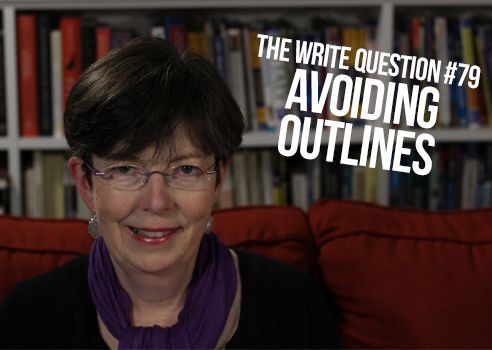Viewing time: 4 mins. 35 secs
The Write Question is a weekly video podcast about writing that I started in 2017 and that ran, more or less weekly, until April 2022. This is a republication of issue #79, with advice on how writers can avoid outlines. The post first ran on Jan. 4/19.
Transcript:
Welcome to The Write Question, I’m Daphne Gray-Grant and my topic today is how writers can avoid preparing outlines
I have a question from Jayne Campbell from Toronto, Ontario. Here’s what’s she’s asked.
[recording] “I would like to hear your thoughts on working for a senior leader who insists on having an outline and how to satisfy that requirement without becoming trapped in its confines. I work for an associate vice-president sometimes who insists on having an outline and sometimes we go up to three versions of that outline before I even get to writing my crappy first draft.”
Thanks for your question, Jayne. Ooo-eee. I feel your pain. I don’t know if this will make you feel better, but your boss is wrong. Totally wrong. Outlines do NOT improve writing and they also make life so much harder for the author.
But you’re dealing with a power struggle here so you’re going to need some guerrilla strategies to get around the problem.
Basically, your boss wants to control your writing — perhaps she’s doing it with the best of intent, or maybe she’s a control freak but either way it’s bad news for you.
You didn’t say anything about your relationship with this vice-president so I’m going to give you several different approaches you can try. They all acknowledge her need for control. But I hope they give her that control in a way that’s less painful to you.
First, I suggest you always ask her for several SAMPLES of writing she would like you to emulate for each assignment. This is going to be way more useful to you than an outline because it’s not as confining. I’m hoping that — because she’s a control freak — she’ll be happy to do this for you. But, if not, then YOU should take a number of samples to her. In your most deferential voice possible, you could say something like, “Here are some samples of different approaches. Would you mind reading them and letting me know which one best captures the type of piece you’re looking for?”
If that doesn’t work, then I suggest you introduce her to the concept of mindmapping. The great thing about mindmapping is that you can do it on a whiteboard with more than one person. She may enjoy the hands-on nature of this approach and it may give her the feeling of control she really needs.
I’ve included links below to other posts and videos I’ve prepared on mindmapping.
If you have a good relationship with her, it’s probably worth explaining to her that mindmapping allows writers to be more creative, interesting and persuasive. You might also remind her that you have no objection to rewriting or editing and that you’d be pleased to do plenty of that once you’ve written your crappy first draft.
If you have a really good relationship with her, why not suggest an experiment: Time how long the whole writing process takes you currently (be sure to include the time it takes you to do all that awful, totally unnecessary outlining) and then time how long it takes you using the mindmapping approach. I’m certain that mindmapping will take you a fraction of the time and if she’s the least bit open-minded, she’ll see that, too.
However, if she won’t “bite” at any of these approaches, then you’re going to have to get sneakier. In that case, I suggest you do the mindmap yourself and then turn it into an outline. Regrettably, you’ll be adding more steps to the process but you’ll still enjoy the multiple benefits of mindmapping.
I always think it’s so sad when bosses impose misguided ideas — like outlining — on their employees. What’s deeply ironic about this is your boss is not only lowering the quality of your work with her demand, she’s also making the nature of your job more difficult. If she is in any way approachable, it’s worth having a respectful conversation with her about this situation.
Finally, let me wrap up with a quote from Tony Buzan who wrote or co-wrote more than 80 books on the subject of mindmapping: “Mindmaps are the meta-language of the human race.”
Thanks for the question, Jayne. Here’s another idea you might want to consider. Perhaps you could leave a copy of one of Tony Buzan’s books on your boss’s desk? They’re colorful and persuasive and —as someone who’s been nominated for both the Nobel Peace Prize and the Nobel Prize for Economics — he has great credentials. Good luck!


